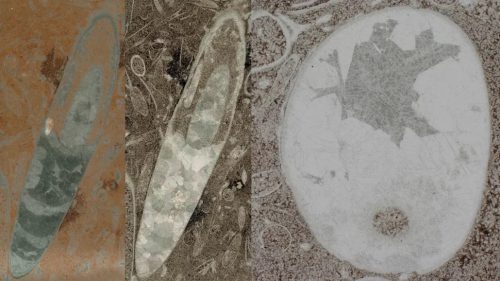Maybe it doesn’t look like much, and maybe it’s tiny at only 1.5cm long, but this is a 522 million year old cephalopod shell, found in Newfoundland.
To be fair, the investigators are cautious, only tentatively calling it a cephalopod…but it’s an oval shell with a siphuncle. None of the squishy bits are preserved, unfortunately, but it’s enough to suggest that this is a cephalopod, especially since it’s at about the right time period predicted.
One sad thing about it is that we still feel a need to issue a disclaimer when commenting on it.
“Cephalopods are really different from other mollusks,” Vecchione said. Still, “we do know that they’re mollusks, they’re not from outer space like some people have said.”
Yeah, those assholes from the Panspermia Mafia, Wickramasinghe etc., have really tainted the public perception of cephalopods.



Of course they came from outer space. Everything on this planet came here from outer space.
That disclaimer links to another article on livescience
https://www.livescience.com/62594-octopuses-are-not-aliens-panspermia.html
that notes the panspermia guys’ specific claim that the octopus itself was evolved from a squid by being infected by an extraplanetary virus during the Cambrian, which was four times longer ago than the octopus split, so their timelines are haywire if that is indeed their claim.
In any case, I do find it quite shiftless for people to take a seemingly strange event and directly claim “god did it” or “space did it” or some other non-explanatory explanation. That kind of claim is really only convincing for those who already fully believe.
@azpaul3, you mean the planet’s atoms came from outer space as the solar system formed. That’s different than saying cephalopods came from outer space.
I always try to picture evolution’s deep time thus. I’m a heavy smoker, rolling my own cigarettes. That requires 2 mm thick packages of 60 cig papers. I then envisage a portret of a parent animal on each leaf of paper, aging through time, and then being replaced by a picture of the child. And so on and on.
I would dare any creationist to tell where and when the pictures change from one kind to another.
So far, I have calculated half a billion paper leaves of 60 in a 2mm pack, to amount to a stack of almost se-ven-teen ki-lo-me-ters.
Of course, each cig paper leaf represents one year.
Outer space. Newfoundland. Same-same.
Is “mollusks” an old-fangled, 17th Century way of spelling “molluscs?”
It’s one of the Star Spawn. Eleventy!!!!!..!!! RUN.
@8. flange : I still see Mollusk spelt (or should that be spelled? One is wheat the other magic so?) that way today.
Wikipedia, port of first call research wise notes :
Source : https://en.wikipedia.org/wiki/Mollusc_shell#cite_note-1
Then also notes and cites this article here See :
https://web.archive.org/web/20090217054126/http://www.conchologistsofamerica.org/articles/y1996/9609_rosenberg.asp
Plus there’s this summary :
https://wikidiff.com/mollusk/mollusc
Saying its just an alternative fom and both are okay and valid. Which I think as long as people know what you’re talking about is generally the case?
(I sure hope so, given my lousy typing & previewing ability..)
I took an invertebrate paleontology class as part of getting my master’s degree in geology, and…damn, that was well over a decade ago, but this brings back wonderful memories. Our professor (emeritus, talked back into teaching on contract while the department begged for money to hire his replacement) got excited about how invertebrate fossil lineages showed evolution in those lines. He had an uncanny ability to make these sketches on a whiteboard of how the shells of some lineage changed over time, just squiggles…and then when we did our lab, and examined samples of the fossils, that made the squiggles make enormous sense, but also the squiggles made the actual lab samples make sense.
From a geologist’s point of view, invertebrates tell us about depositional environments, and how those change over time. They’re an extremely important source of information, although they don’t stand on their own. But still. Everything I know about biology could be written on my thumbnail in readable type. But the grandness and scope of all these changes in all these lineages, the rise and disappearance of them, the graceful fossil record of the violent scope of change of our planet over deep time…I am still awed, and continue to be awed.
StevoR, you sent me down a rabbit hole as well. Ever heard of the Mandela Effect? https://en.wikipedia.org/wiki/False_memory#Mandela_Effect — Anyway, happened to me with mollus vs mollusk vs mollusckque (apparently that exists too).
Mollusc Versus Mollusk as a Noun: When used as an English noun, mollusc is a soft-bodied invertebrate of the phylum Mollusca, typically with a hard shell of one or more pieces, while mollusk is alternative form of mollusc. https://www.factualist.com/difference/mollusc-versus-mollusk/
Mollusckque is apparently another derivative: https://www.researchgate.net/publication/267154091_Conchatenations_Mollusckque